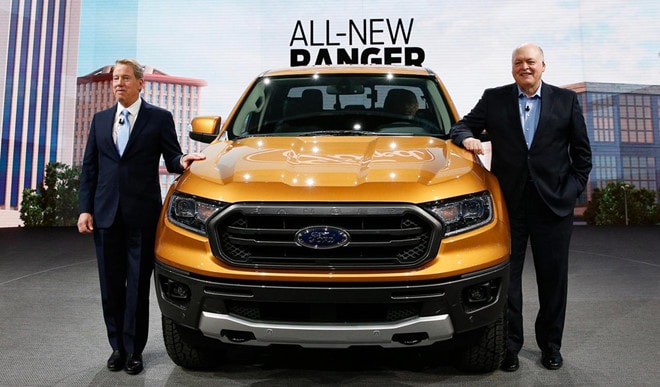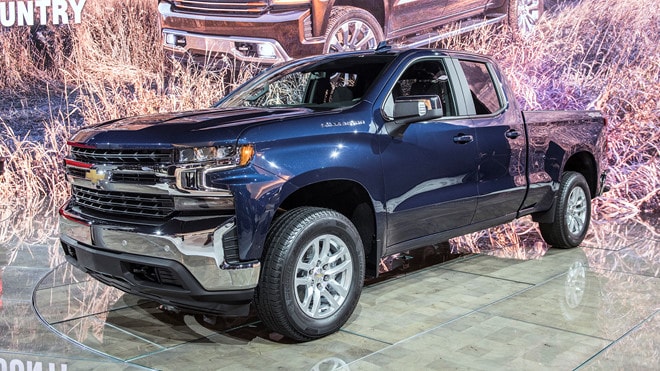Detroit Auto Show - Hope to Save the Auto Market
The Detroit Auto Show shows the trend that manufacturers are focusing on to develop to save the declining auto market.
The Detroit show returns after finishing 2017 with total U.S. sales of more than 17 million vehicles for the third consecutive year. The success was driven by low gas prices and a growing appetite for pickup trucks and utility vehicles.
|
Pickup trucks are the segment that helps automakers get through difficult times.Photo: Reuters. |
Mike Jackson, CEO of AutoNation, the largest auto retailer in the US, said: "2018 will be a very good year for the auto market."
While overall auto sales remain strong, consumers are buying fewer new cars. Retailer purchases, considered the best indicator of market demand, fell slightly in 2016 and 2017. Some automakers are offsetting the decline in retail buyers with business customers, such as leasing.
More worryingly, the decline in retail sales shows no sign of abating even as manufacturers apply hefty discounts, cutting into their profits. The average discount on a new car is now about 11% of the sticker price, up from 8% in 2014.
Furthermore, today’s younger buyers are less interested in owning a car than previous generations. The purchase of used cars at lower prices is increasing, providing consumers with more attractive alternatives to new cars.
The auto industry has been through many recessions. The most recent one coincided with the financial crisis 10 years ago. Detroit was in trouble. General Motors and Chrysler had to take government bailouts to survive.
Now, analysts are wondering, will the recession of 10 years ago return to the US auto market?
Alix, a strategy consulting firm, predicts that auto sales will continue to decline this year, and fall sharply in 2019 and 2020. Alix believes that sales in 2019 and 2020 will only reach 16 million vehicles.
Ironically, the shakeout in the U.S. auto market comes at a time when automakers are adding factories. BMW and Audi are building new plants in Mexico. Volvo’s South Carolina plant is set to open this year. Toyota is building a pickup plant in Mexico, and a joint plant with Mazda in Alabama. Fiat Chrysler is upgrading a Michigan plant that has been idle for more than two years. The company has also expanded Jeep plants in Ohio and Illinois.
“Automakers are producing more cars than they are selling,” said Ron Harbour, an auto expert at Oliver Wyman.
Part of that is because the market is slowing, he added, and secondly, Americans are favoring SUVs and pickup trucks, which has led to a decline in sales of sedans and compact cars. The Camry used to account for 25% of Toyota’s new car sales in the US, but now it’s down to 15%.
Automakers have seen a divergence in their business operations, creating a paradoxical reality: pickup truck factories are running at full capacity, but many others are forced to cut back.
According to data ofAutomotive News,Ford, Toyota, Honda and Hyundai have cut production at their auto plants by 10% to 22% in 2017. GM cut production at its Lordstown, Ohio, plant by about 33%, while another major GM plant in Ontario has cut production by nearly half.
|
“I wouldn’t be surprised to see some auto plants closing in the next few years,” Harbour said.
In the past, Mitsubishi closed its Normal plant in 2016, and Ford closed its pickup truck plant in Minnesota in 2011.
But things get worse when manufacturers don’t expand their markets together, but instead compete for market share to avoid production cuts. This strategy was implemented by GM, Ford and Chrysler in 2000, and it didn’t work.
This past week, executives at Honda, Subaru and several other manufacturers acknowledged that they want to increase market share, despite a shrinking auto market.
The one factor that could help salvage the current difficulties in the US auto market is the pickup truck, which now accounts for about two-thirds of new vehicle sales. "Pickups are at record profits, and this path will help manufacturers get through the recession," said Jack, CEO of AutoNation.
Manufacturers’ focus on trucks was evident at the Detroit auto show. Chevrolet introduced the new Silverado, Fiat Chrysler introduced the Ram 1500, and Ford unveiled the 2019 Ranger.
This year's Detroit show was not as exciting as previous years. Several major brands, including Audi, Cadillac, Chrysler and Lincoln, did not have new vehicles. Porsche, Jaguar and Land Rover did not even participate.



